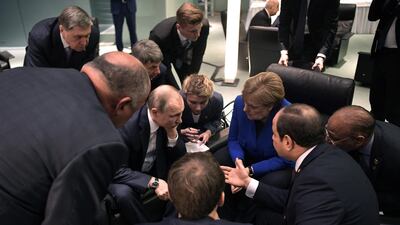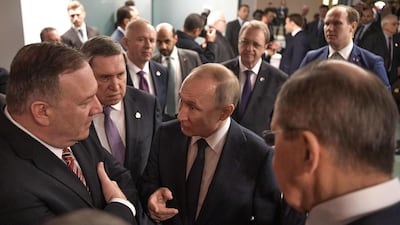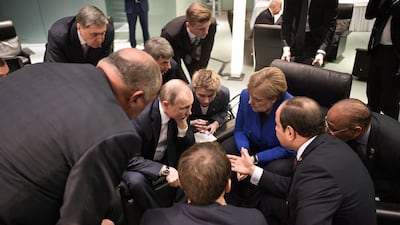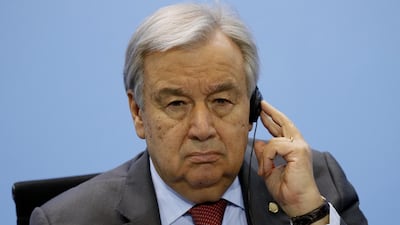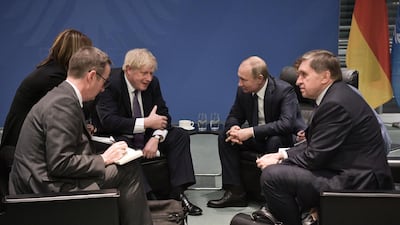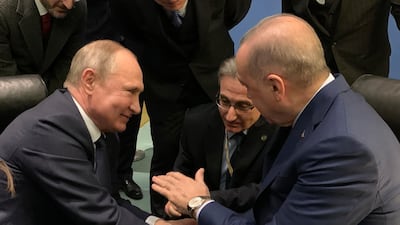When German Chancellor Angela Merkel spoke at the end of the Libya peace summit in Berlin, she was flanked by her foreign minister, Heiko Maas, and UN Secretary General Antonio Guterres.
Russian President Vladimir Putin and Turkish leader Recep Tayyip Erdogan, who seized the initiative in Libya and left European and Arab nations scrambling to respond, had left.
So had Libya’s two rival leaders, Field Marshal Khalifa Haftar and Prime Minister Fayez Al Sarraj, although technically neither of them took part in the summit.
The scene at the end of the day was in stark contrast to images from the discussions showing Mr Putin at the centre of things.
Mrs Merkel can be seen looking to the Russian leader as Egyptian President Abdel Fattah El Sisi makes his case on the sidelines of the summit.
In the heightened rhetoric, Sunday’s principal goal was to plot a path for a lasting peace in Libya. But the talks were also aimed at getting Europe back into the game.
Mrs Merkel said she felt both of these things had been achieved but there was an “arduous road” ahead.
“We all agreed that we need a political solution,” she said. “Recent days have shown that there is no chance for a military solution.”
Mr Guterres tweeted on Monday: “The world was facing the risk of a true regional escalation in Libya and that risk was averted in Berlin.
"All participants committed to refrain from interference in Libya. This must be adhered to, as well as the call to silence the guns.”
The talks ended with agreement between the leaders of the 12 countries involved, as well as the Arab League, the UN, EU and African Union.
Mrs Merkel stressed a commitment from participants to end interference in Libya and bolster the UN arms embargo in place since 2011.
The embargo has been routinely flouted since the Nato-backed intervention against 40-year ruler Muammar Qaddafi.
The most promising gain was the planned creation of a "five by five" military council to oversee a lasting ceasefire.
The five figures on each side, nominated from Field Marshal Haftar’s Libyan National Army and Mr Al Sarraj’s Government of National Accord, will meet in Geneva to discuss solutions.
Despite their commitment to the military council, questions remain over its effectiveness.
Similar bodies created in post-2011 Libya, such as the country’s Constitution Drafting Assembly and House of Representatives, had huge pressure placed on them by opposing sides.
Many members eventually resigned because of the danger involved in trying to operate with any independence.
There were clear shortcomings in the conclusion to the summit. The lack of an agreement to a more concrete ceasefire beyond the truce arranged by Turkey and Russia this month has blocked the possibility of peacekeeping troops from Europe or elsewhere.
Despite enthusiasm from Britain and Italy, Mr Guterres was unequivocal: a ceasefire cannot be monitored by peacekeepers if there is no ceasefire.
Mrs Merkel also admitted there had been no talk of sanctions to enforce the arms embargo or to punish other external interference in Libya.
Without penalties for intervention, such as Turkey recently sending 2,000 Syrian fighters to bolster GNA forces in Tripoli, it is hard to see any long-lasting change to Libya’s situation.
The extent to which the ambitions of the talks failed were shown in a draft communique seen by Reuters and CNN as the summit began.
The 55 articles in the six-page agreement signed on Sunday did not contain a ceasefire enforced by UN Security Council sanctions that were in the draft.
But the participants did commit to "refraining from interference in the armed conflict or in the internal affairs of Libya", and urged all international interests to do the same.
The draft communique shows the direction for future Libya summits. GCC capitals have indicated a commitment to the proposals in the draft and to the UN-led peace process for Libya.
Dr Anwar Gargash, the UAE Minister of State for Foreign Affairs, tweeted his support for the recommendations in Berlin after the conference.
"We support the Berlin conference and its outputs, and we are seeking with the international community and sisterly Arab states a political solution," Dr Gargash wrote.
He emphasised the importance of Arab involvement in the process.
"The presence of Egypt, Algeria, the Emirates and the Arab League is a necessary guarantee that the Arab dimension is present,” Dr Gargash said.
The Berlin conference’s significance will lie in the line Arab and western nations have drawn after the US's relative disengagement in the region.
Secretary of State Mike Pompeo’s most conspicuous intervention at the summit was to chastise Egypt for the death in prison of a US citizen.
After he left Berlin, Mr Pompeo said he was happy for Mrs Merkel, the UN and others to take the initiative in Libya.
“There was progress made towards a full-fledged ceasefire, a truce, temporary stand-down," he said. "There’s still a lot of work to do. It’s a complicated battlefield.
“But you had President Erdogan, President Putin and Chancellor Merkel all making a sincere commitment.”
Two major oilfields in south-west Libya began shutting down on Sunday after LNA forces closed a pipeline, effectively closing the country's oil production.
Libya's National Oil Corporation said the change could cut national output to a fraction of its usual level.
For lasting change in the country and in the lives of Libyans, the summit in Berlin must be, as leaders said it would, the first in a series of increasingly ambitious steps.
